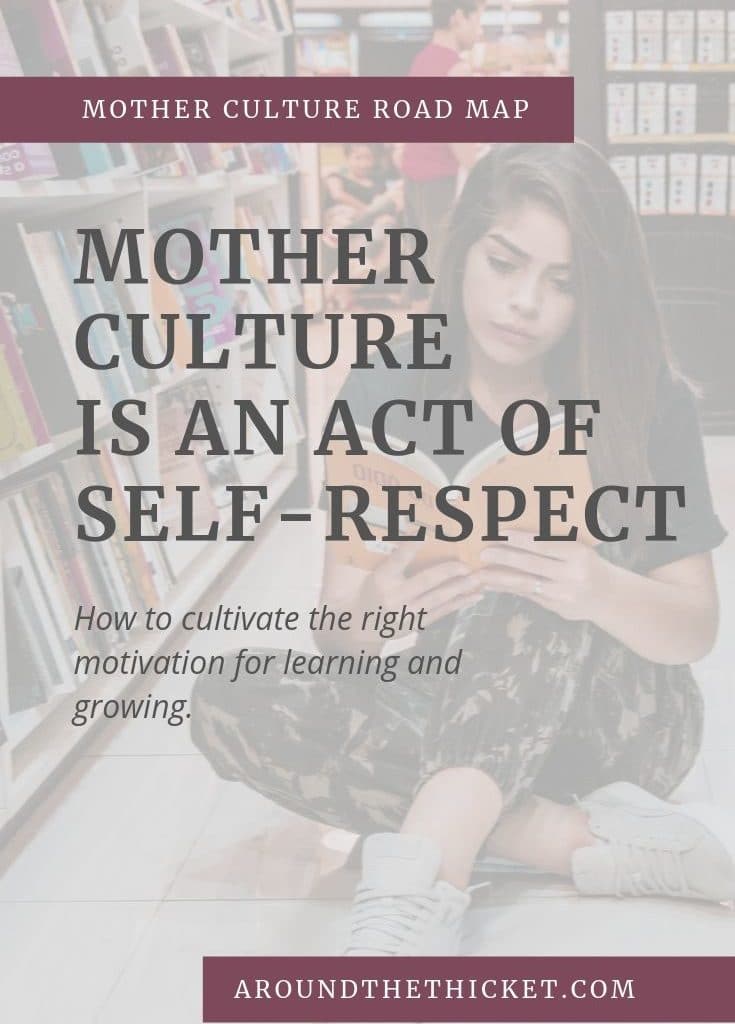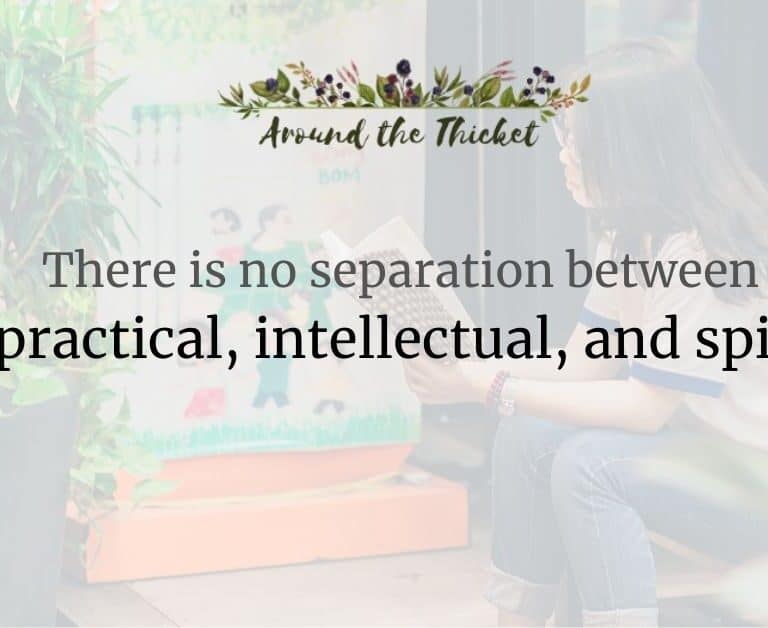Mother culture is an act of self-respect.
Most of us are familiar with the idea of self-care. “Mom, you need to take care of yourself. Set apart some me-time. Go out for coffee. Get a manicure. Eat a snack so that you don’t get hangry. Sleep when the baby sleeps (lovely idea, until you have more than one).” The underlying idea says, ‘It’s ok to be a little bit selfish with your time and resources, because you can’t meet the needs of others if your own needs are unmet. Plus, you deserve it.’
I love a good latte. I don’t have a problem with doing fun things or taking naps. However, I do have trouble when people start to put ‘mother culture’ in the self-care category. Too often, self-care seems to confuse a person’s needs with a person’s wants and glorifies selfishness by placing it under a guise of helping others. It is about rewarding yourself for working hard, or pleasing other people, or ‘resting’ in order to enable yourself to work harder. But rest for work’s sake isn’t rest, pleasing others isn’t the same as meeting their needs, and we can’t always afford rewards.
It is generally true that in order to have the resources to pour into others – mental, physical, spiritual, emotional – our own basic needs must be met. So how do we unpick our needs from our wants? How do we motivate ourselves to meet those needs without cultivating our vices?

Self-respect does away with extrinsic motivation.
Charlotte Mason’s fourth principle is a call to parents and educators to see where their authority over their children ends. Her philosophy says that minds crave knowledge just as bodies crave food and drink. This craving is enough to drive our children to learn. To try to motivate our children to learn through the use of rewards or punishments is overstepping the bounds of our authority, and disrespects the personhood of our children.
Why is this? When I think back to my own education, I remember a lot of rewards (grades, accolades, scholarships). I also remember a lot of fear (homework slips, missing recess, disappointed teachers and parents). Rather than feeding my intrinsic desire to learn, these systems reinforced my desire for approval, acceptance, and to avoid embarrassment and shame. From Charlotte Mason’s perspective, this is a form of manipulation.
I don’t think my education was in anyway unique. In fact, given how generally sticker charts and prizes were used to encourage good behavior and good grades, it’s little wonder that the self-care culture is so prominent. Our desire for rewards and pleasures has been overfed for a long time at this point.
In order to recover from this, we need to show ourselves what Charlotte Mason asks us to show our children: respect. Self-respect acknowledges that we all have desires to make others happy, to fit in with our social groups, and to get ahead in life, but that these desires are quickly skewed out of their appropriate proportion if we rely on them to motivate us to meet our needs. And if mother culture is truly about character development, then it is essential that we motivate ourselves the right way.

Rekindle inner motivation by feeding the right desire.
I recently picked up a book called Intuitive Eating. I had read a summary online and was intrigued by the idea. The authors propose that the key to achieving and maintaining a healthy weight is to get back in touch with your senses of hunger and fullness. ‘Eat when you’re hungry. Stop when you’re full’ is pretty simple advice, but amid the ocean of calorie and food-restricting diets, it seems novel. Restricting calories causes our bodies to cling to fat out of concern that it will be starved. If our bodies know that they will be fed when they are hungry, the body’s drive to overeat will slow down.
As Charlotte Mason says, our minds are like our bodies. Because of this, I think that there are some important points to consider here..
- Eating for any reason other than hunger confuses our bodies and makes us unhealthy. Similarly, pursuing knowledge for something other than an inner hunger to learn grows our vices. It makes us spiritually unwell as our appetites for worldly gain increase. If in school we were motivated to behave well by receiving stickers on a chart, then we may have grown to want to have more stickers than our classmates. Our desire to do better than others was fed and grew – leading us to the vice of comparison with others.
- The solution to ‘disordered eating’ is to start eating for the right reason – hunger. The more you do this, the more you get back in touch with your sense of hunger and fullness. Similarly, if we have ‘disordered affections’ around learning, the solution is to feed our minds healthy food that both nourishes and satisfies. As we feed our minds properly, our intrinsic motivation to learn will grow.

How to feed your mind properly
If we want to grow our intrinsic motivation to learn, especially if we have all but lost it somewhere along the way, then it is essential to understand how to feed it. Charlotte Mason gives us three steps to follow.
- Look for books of literary quality. If we seek out beautiful living books for our children, then let us do the same for ourselves. This doesn’t necessarily mean that the books we read have to be complicated or hard to understand. Living books can be long or short, fiction or nonfiction. But we do need to look for books that are well written. Peruse the Ambleside Online curriculum and choose from their booklists. Follow along with the Literary Life podcast. Find something just at your level.
- Cultivate a sense of progress. There is a joy in making your way through a book. It is also boring to rehash the same bit of information over and over again. Be wary of choosing the same type of book or the same topic repeatedly. If you’re challenging yourself to read through a thick tome, consider keeping a book stack with a few different types of books in it to give yourself diversity. My own stack usually includes a Charlotte Mason volume, an easier non-fiction read, and a novel that I read in parallel.
- Express what you have learned. Talk, write, ponder over what you have read. Charlotte Mason calls ‘telling back what you have learned’ narration. Narration takes something you have read and helps you to process it, to internalize it, to make it your own. This is how we really do the work of educating ourselves.
Mother culture is worth our time. Not because we are somehow refreshed to work harder and serve better at the end of it, but because it feeds our minds, and thereby grows proper motivations within us. No one would question a mom taking time to eat breakfast. In fact, with every baby I’ve had, one of the first questions I was asked by health professionals was ‘Are you remembering to eat?’
We need to ask ourselves if we are feeding our minds as well. Too often, we forget to do this. It is a serious challenge to make this a priority, and it’s easy to fall into a line of thinking that says we need to do things because ‘everyone else is’ or because we’ll be embarrassed at book club if we haven’t read the chapter or because we’re fearful that we’re not smart enough to homeschool. However, we don’t have to feed fear and guilt. We can reclaim and regrow our inner desire to learn. To do so is an act of self-respect.








